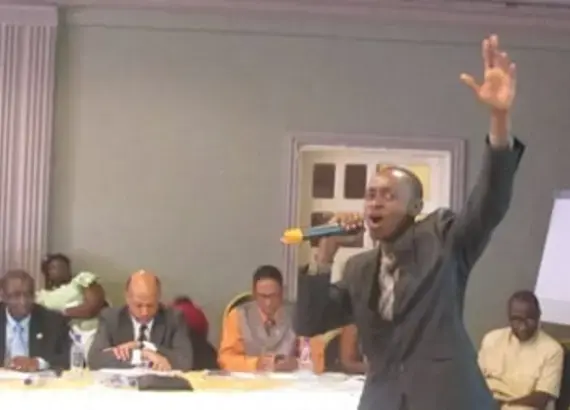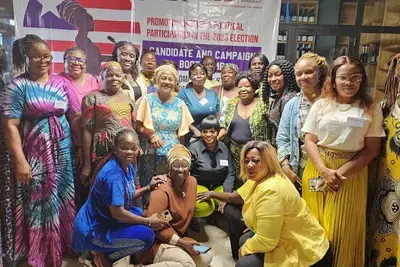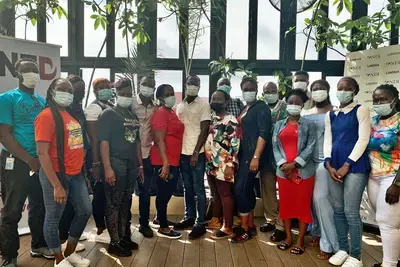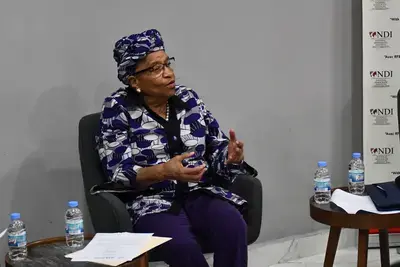
Success Story
Youth Development Seminar Focuses on Job Creation for Liberia’s Youth
Nine years after the end of a civil war that ravaged the country for more than a decade, Liberian youth continue to face staggering unemployment, lack of access to quality education and limited representation in government policymaking.
Of the 64 percent of Liberians living below the poverty line, 68 percent are young people. Among the unemployed, 58 percent are youth, members of a generation that grew up without access to education and are unqualified for many of the jobs currently available. Many have turned to crime as a result.
To help tackle this problem, more than 125 individuals, including legislators, policy experts and representatives from youth institutions, such as the Federation of Liberian Youth (FLY), came together in Monrovia last month to address key priorities for lawmakers to improve the situation. The seminar, entitled “Toward the Fulfillment of a Robust Youth Development Process in Liberia,” educated Liberian legislators about the challenges the youth population faces and policy options to address them.
The seminar was organized by the House Committee on Youth and Sports and the House Committee on Labor, in collaboration with NDI.
Attendees included Tornorlah Varpilah, minister of youth and sports, and Dr. Charles Brempong-Yeboah of Ghana, former member of parliament and deputy minister of manpower, youth and development. Vice President Joseph N. Boakai gave the keynote address, urging a focus on issues such as how the “government can motivate private companies to take up their corporate social responsibilities to create more opportunities for youth.” He stressed that “failure is not an option.”
Other speakers included Aubrey McCutcheon, NDI’s resident director in Liberia, the Hon. Lester Paye, chairman of the House Committee on Youth and Sports; Isaut Ville, second vice president of the FLY; and the Hon. Christian Chea, chairman of the House Committee on Labor.
The seminar covered topics such as job creation in a post-conflict situation, empowering youth and identifying main priorities for development and job creation, and the role of the legislature in monitoring how the Executive Office carries out its national youth development programs.
Youth participants stressed the need to strengthen the connection between education and the labor market through vocational training, enhance coordination among government ministries for a more holistic youth policy, improve oversight, and deal with the large criminal youth population.
“There is bad governance and no proper allocation of natural resources,” said Isatu Ville of FLY. “We always hear that youth are the future, but it is always the world of tomorrow and never of today.”
Bill Yaseah, a young Liberian singer, composed a song especially for the seminar entitled “Empower the Youth Now,” which he performed during the event. An excerpt appears below.
“Don’t want to go back to AKs and bushes…
We don’t want to go back to war.
Don’t want to sit down here doing nothing…
We just want to get us involved.
‘Youth Policy’ is just what we’re asking…
We don’t want nothing more.
When you start building schools and molding minds
Together we will push our country forward.”
Minister Varpilah has said that he wants to involve Yaseah and his song—which calls on the country’s leaders to train young people with the skills they need for employment—in the ongoing youth policy process.
Dr. Brempong-Yeboah shared examples from Ghana of concrete employment and entrepreneurial projects involving young people, such as travelling cell phone repair businesses, and encouraged Liberian youth to “change their mind-set from seeking white collar formal employment to cultivating an entrepreneurial attitude that will see them start their own businesses.”
With the support of NDI and USAID, Dr. Brempong-Yeboah met with legislators, Varpilah and youth organizations after the conference to identify next steps for creating legislation that will benefit youth and increase employment. During the meetings representatives of the House committees said they would give a higher priority to youth development. Varpilah said that specific programs to implement youth policy will be drafted in the first quarter of 2013, and the youth organizations agreed to reform FLY to represent a broader spectrum of youth and improve its strategy.
The seminar is the fourth in a series coordinated by NDI. Past NDI legislative policy seminars have focused on decentralization of power, ways to address women's needs in the country's budget and elections law reform.
Published Nov. 8, 2012



